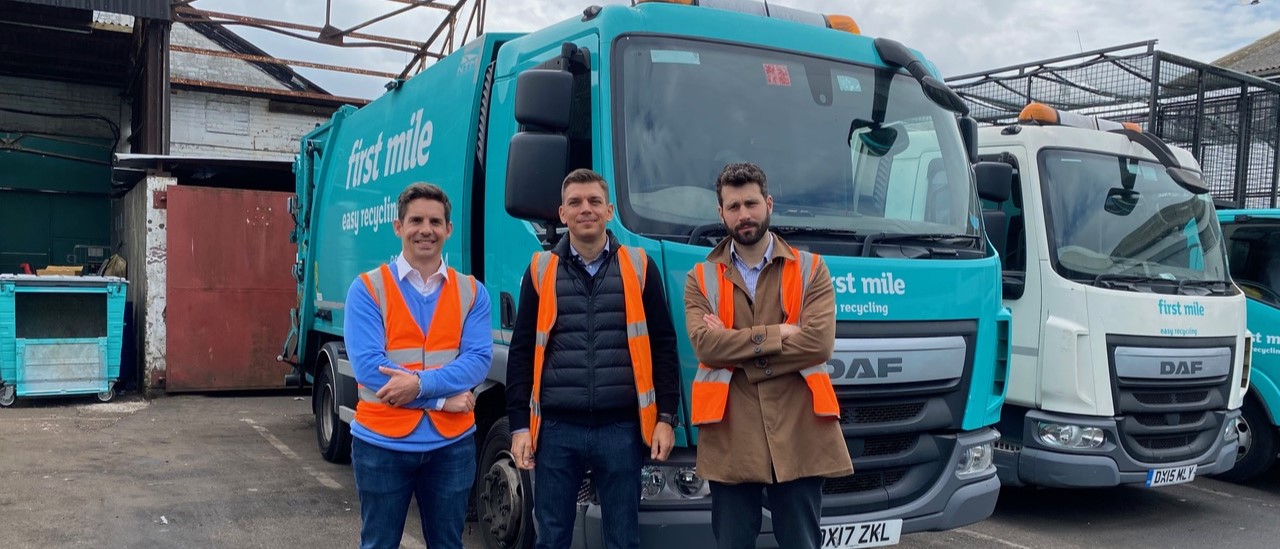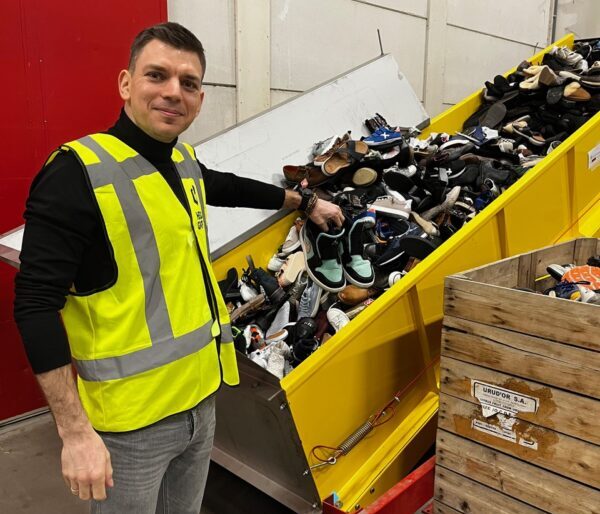Who are Waste Labs?
Q: Can you give a description of your company?
A: I’m Vladimir. I am an entrepreneur and co-founder of two companies – Waste Labs and Black Square. Our main drive is to facilitate industries in their transition from using virgin materials and natural resources to sustainable manufacturing and energy production from available waste. Large and small businesses launch their circular economy projects but it’s absolutely crucial to ensure their positive economics if we want to make it business-as-usual. This is often hard to achieve due to the high costs of feedstock, technology availability offtake, and financing challenges.
We combine our expertise in waste and energy with data and AI products to create commercially viable solutions for different industries across the globe. We focus on designing and launching recycling and energy production systems utilizing different waste types and materials. Our projects can be very diverse. For example, we helped an infrastructure investor utilize waste from overloaded landfills to supply electric power to disadvantaged areas in Indonesia. Or designed and operated a recycling system for footwear brands and retailers in the UK.
Waste Labs, started in early 2020, is the software side of our mission addressing waste and feedstock logistics. Black Square, a spin-off launched in 2023 in the UK, offers project development services to investors and owners of Waste-to-X and recycling systems.
Why Entrepreneurs First
Q: Why did you decide to apply to Entrepreneurs First?
A: My journey spans from a corporate career in the energy sector, both nuclear and renewable, to starting private businesses in Southeast Asia. A desire grew within me to leverage my industry experience digitally, although I wasn’t sure how. This tech realm had its unique set of rules and attracting venture capital firms was different than my earlier dealings with infrastructure banks or private equity firms.
I attempted a venture independently, which unfortunately didn’t pan out. Entrepreneurs First caught my attention because, unlike most accelerator programs, they focused on individual skill sets and domain expertise of future founders rather than business ideas. If your expertise aligned with their thesis, they welcomed you into the program.
Entrepreneurs First Application Process
Q: Do you remember to describe the application process briefly?
A: The application process back then was straightforward for me. You just completed a form on their website, attached your LinkedIn profile, and explained your strengths and weaknesses, your experience, and why you wanted to build a startup. That was the initial filter. After that, I went into the second round which involved one or two face-to-face conversations. Being in Singapore made that convenient. Soon after, I received a letter of acceptance. The process has evolved since then, so I’d recommend checking their website for the current application requirements.
Q: Do you have any tips for this process?
A: Definitely. One thing that stands out to me is the importance of understanding your strengths. Whether you’re applying for an accelerator or starting something new, you need to pinpoint your qualities. Ask yourself: what are my superpowers? What am I passionate about? List five to ten qualities you believe you can leverage. Then, using these qualities, seek a partner that complements you in skill set, emotional aspects, domain expertise, and work experience. That pairing would be your best shot. It’s a simple but challenging exercise that everyone should start with.
After Being Accepted
Q: What does the program include?
A: The full program takes 6 months but not everyone gets to the end of it. In the initial twelve weeks, participants collaborated with each other trying to find a co-founder and establish a team. Spanning your complementary expertise, you try to build, shape, and validate your hypotheses about your future business.
Throughout this phase, they establish their startup and receive guidance from a global network of advisors.
In the next twelve weeks, you will present your startup pitch to an Investment Committee for pre-seed funding. Successful teams are selected to advance to the next stage of the program, where they continue to develop and prepare for seed funding. The program concludes with Demo Day where your startup will be presented to local and international venture funds and business angels. For founders who do not receive funding, they complete the program and become part of the global EF’s alumni community. This is a very strong and supportive community, so many of them find jobs in the program’s portfolio companies.
The overarching benefits of joining such a program include a structured entrepreneurial thinking and working process, access to a vetted pool of potential co-founders, and comprehensive support during the fundraising stage. From my experience, it significantly improved our investment outreach compared to my independent attempts. Given the tangible benefits, I’d wholeheartedly recommend aspiring entrepreneurs to enroll in this program and commit wholeheartedly.
A Surprising Turn in Waste Labs’ Experience
Q: Do you have any “aha” moment that you want to share with us? Like a moment when you found yourself very surprised by something?
A: Well, the most valuable moment for me, although it might not exactly be an “aha” moment, was when we signed our first contract. It was incredibly empowering. This took place during the program. We began seeing ourselves as an early revenue company, and that was the best form of validation.
On one side, you have investors throwing challenging questions at you, making you feel unsure or even bad when you can’t answer them. It’s tough, sometimes even making you angry at yourself. But then, you have a client, someone ready to pay for what you’ve built. This payment, this show of belief in your work, it balances out all the negativity and gives a boost of positive feelings.
You know, you can be grilled about your long-term financial plans, about potential risks, but when you have an international company putting their money on your services, it makes you focus on the brighter side. Every big win, every new contract, they lift your spirits. The journey of a founder is filled with highs and lows, and securing contracts or tackling challenging projects always gives a feeling of empowerment.
Life After the Accelerator
Q: What is the status of the company today?
A: Your question brings me to another thing I want to share. When you’re running an early-stage company, you’ve got to make sure your product fits the market you’re aiming for. What might be a hit back home might not necessarily click the same way in a new country or with a different set of customers. So, while we’re all about that growth, it’s essential to take a breather every now and then and ask ourselves if we’re still on the right track. Our pace and flexibility of decision-making is very different from those of big corporate giants. That’s why we’re always tweaking things to see if our products and services are still the right fit while we chase new markets, clients, or projects. Take, for example, our current focus on Black Square. It all started when our clients started asking for more than just software—they wanted a complete service. So, that’s exactly what we’re cooking up now.
Tips for Founders
Q: Any final tip for founders considering applying?
A: Just yesterday, I had a call with a good old friend who’s thinking of starting his own business. He’s high up in a big company but feels he can create more value outside of the corporate world. He believes starting his business would give him the freedom and meaning he craves. I told him that while starting your business might offer more flexibility, it comes with many strings attached – from investors, product-market fit, and other challenges.
Working for a big company like Shell or Microsoft, you might not face these issues as critically as I do. My advice is: don’t be overly romantic about starting a business. If you’re up for the challenges and can handle the ups and downs, go for it. It’s better to try than regret not trying. But don’t assume it’s automatically better or easier than what you’re doing now.


